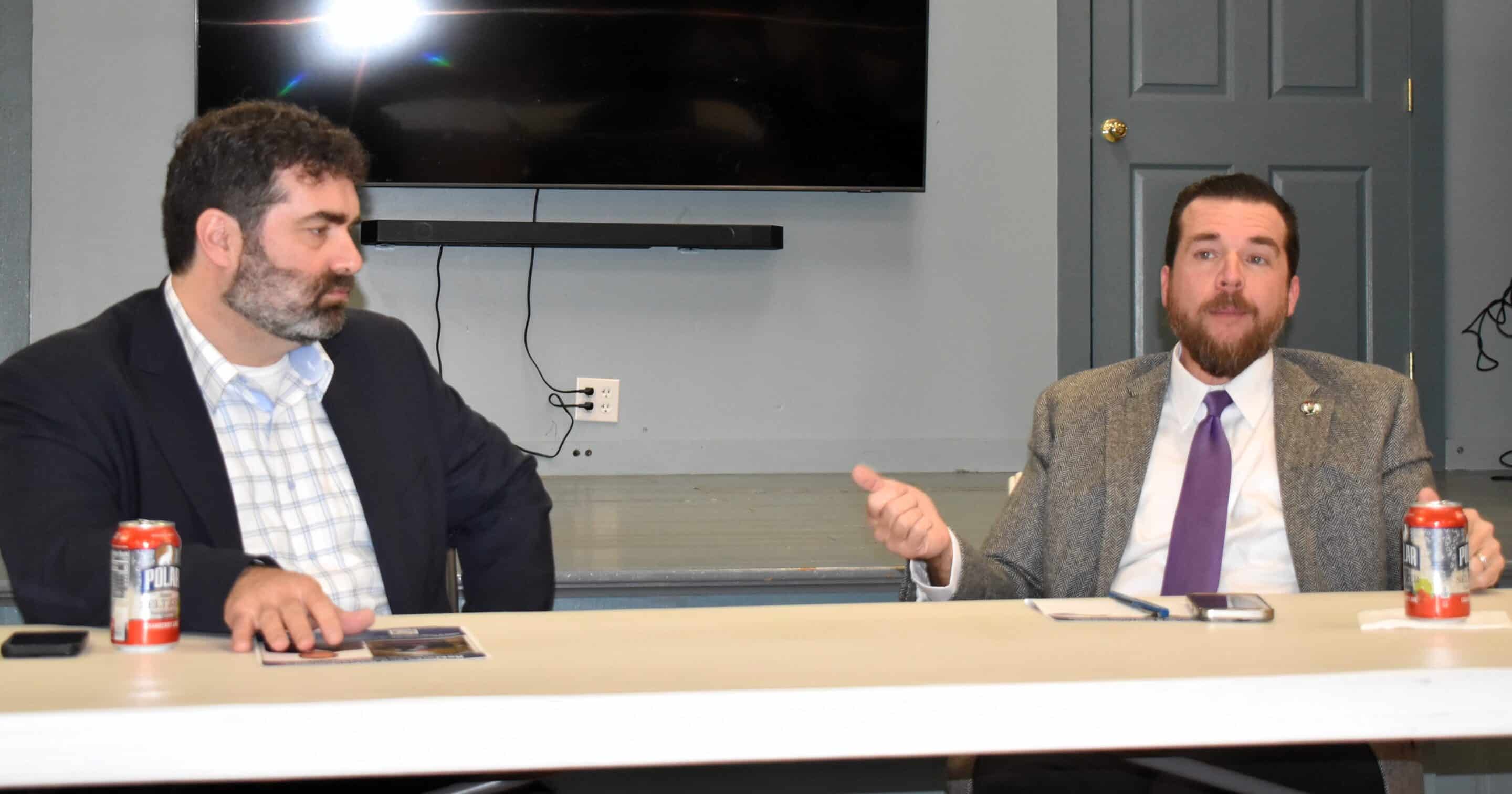State Sen. Paul Mark and state Rep. Nicholas Boldyga during a town hall meeting at Stanton Hall on Feb. 11.
Reminder Publishing photo by Amy Porter
HUNTINGTON — State Sen. Paul Mark (D-Becket) and state Rep. Nicholas Boldyga (R-Southwick) hosted a filled town hall meeting at Stanton Hall on Feb. 11 to hear from residents of the hilltowns about issues of concern to them.
Mark said he represents Huntington and 56 other cities and towns, the largest legislative district in the history of Massachusetts that is bigger than Rhode Island. He said even if he visited a town a week, he couldn’t fit everyone in a year.
Instead, Mark hosts regular monthly meetings in some of the larger towns in the district, and once a month travels to smaller towns. Jon Gould, district director, covers 25 of the smaller towns more regularly, he said.
Mark said he is honored to have a working relationship with Boldyga, who started the same year as he did in the House of Representatives.
Boldyga commented that the Huntington meeting had one of the best attendance in “quite some time.” Prior to the redistricting, he served Agawam, Southwick and Granville, and now also serves Huntington and six other southern hilltowns.
“We do have a great working relationship. We focus on the local issues,” Boldyga said about Mark, adding that while they are on different political spectrums, they can still be adults and have conversations when they don’t agree.
“It’s unfortunate on a state and national level that very few people are talking to one another,” Boldyga said.
Mark then explained where the state is in the legislative process. He said at the end of the last session, everything that didn’t get signed into law, died. Currently, 200 bills have been filed, and by the end of that process, 4,000 to 6,000 bills will be filed. Committee assignments will be given out next week.
Mark said the governor filed her first version of the budget, and the house and senate will begin a series of hearings. “We’re at the beginning of the process,” he said.
The pair then took questions from the residents. Many of the questions were about long standing issues of funding parity for small towns in Western Mass., versus Boston and other urban centers.
Brian Forgue of Chester talked about rural school funding, and a bill currently in the Legislature that unties rural school aid from the budgeting cycle and funds it at the full need of $60 million. He said the legislators had not yet signed on.
Mark said he co-sponsored rural school aid last year and would again, and served on the Rural School Commission. He said prior to 2019 it didn’t exist, but has grown since then from $1.5 million to $16.5 million last year. He said the bill Forgue referred to would take it out of the process, and make the funding by right. “The fight still remains,” Mark said.
“We both grew up in small towns,” said Boldyga. He said both he and Mark advocate on their behalf to Boston. “It’s become more rare that people in the House and Senate grew up in the communities they represent. The conversations you’re having with us, we give to Boston. We are with you on this,” he said, adding that Mark yells at the Senate, and he yells at the House, including at the Republicans, on their behalf.
Huntington Selectman John McVeigh talked about how towns could stretch Chapter 90 money, asking, “Is there a way to remove prevailing wage in communities under 5,000?”
Select Board Chair Roger Booth said the issue is bigger than prevailing wage. He said recently Huntington could have bought a new boiler for $15,000, but the local company couldn’t meet prevailing wage, and the town ended up paying $25,000.
“We need to change it for rural areas. It needs to be size appropriate,” Booth said. He said recently Gateway Regional lost a grant because, although they met the grant requirements, there were not enough students.
Booth added that towns can’t afford to pay for a professional engineer stamp on grant applications, which he said could cost them $20,000 for a $10,000 grant.
Following a discussion about dirt roads, Mark said the dirt road issue specifically is going to be discussed in a “Beacon Hill in the Berkshires” meeting on April 5 in Lenox, and he encouraged everyone to attend.
Mark said Ann Gobi, the state’s rural director, now has an assistant which should help her. Forgue said the town of Chester took Gobi for a ride in a school bus on the dirt roads in Chester, with Superintendent Kristen Smidy driving.
“Every community thinks they don’t get their fare share,” said Boldyga, adding, “Why does all the road money go to places where people don’t drive. It drastically needs to be changed.”
Chris Bresnahan of the Hilltown Community Health Centers said she works with vulnerable populations at the bottom of the poverty level, and is starting to get nervous about what is happening. She noted there was already one day where Medicare funds did not come in when expected. “We’re concerned,” she said.
Mark said Massachusetts is probably in as good a shape as any state when it comes to funding. “We have $9 billion saved. We’re not going to knee-jerk spend that; we can backfill.”
However, Mark said 25% of the state budget comes from federal funding. “We can’t backfill it forever. The fear, the worry is real. We can’t wave it away with a magic wand.”
Boldyga pressed Bresnahan on what funding exactly didn’t come in.
Bresnahan said she didn’t know, but would get the specifics. She said HCHC is a federally funded health center, and they are worried about the executive order cutting grants.
“We have to be careful what we hear on the grapevine, that’s why I asked for specifics,” Boldyga said. “If you didn’t receive it, we want to know. You also need to contact your federal delegation.”
Bresnahan said her biggest concern is the impacts that will come down. Mark agreed that it’s a chaotic moment.
“If you are our advocates, how do we support you? What can I do as a citizen to make noise so you’re heard,” asked Brianna Sloane of Huntington.
“If all of you sent emails, not only to the two of us, but to committee chairs and the governor. Committee people should hear from you,” Boldyga said.
Chester Town Administrator Don Humason recommended calling the governor’s office in Springfield.
Mark suggested using networks, such as the Massachusetts Municipal Association. “Rural poverty is something you have in common with Dorchester. Expand the universe,” he said.
“Our town, maybe more so than surrounding towns, struggles to pay a competitive living wage,” said Huntington resident Erica Wells. She asked how does the town pay for an ambulance, higher wages, a police station, and fire station.
“If I had a great answer, we wouldn’t be losing population. How we help you engage is a great answer. We could double every grant you receive next year, and that still wouldn’t be enough,” said Mark.
Boldyga said in Southwick, a town of 9,700 people, his real estate taxes have tripled over the last 15 years, with no services, high taxes and very few businesses. He said Carvana wanted to come, but nobody wanted it, and now Dollar General is looking to come in. He said the Berkshires used to have paper mills and General Electric. “We’ve lost all this industry in Massachusetts.”
Jahala Dufort of Huntington asked what is being done to encourage small businesses in rural communities, and referred to the five empty storefronts in Huntington.
Both legislators said there are a lot of statewide resources to help small businesses, but challenges such as having to charge “exorbitant fees” to cover rent and taxes is a deterrent. “We all want to buy local,” Boldyga said.
Mark asked if Huntington works with the Hilltown CDC. “We work with them,” he said. He said the state will give $25,000 to $100,000 for startup businesses.
Huntington Police Chief Robert Garriepy talked about the Post C certification requirements for local police, and the 27 state mandates they have to comply with. He said the Huntington Police Department has one full time and five part time staff.
“We don’t have the funds for the laws being made. You’re going to eliminate local police departments,” Garriepy said, adding, “The only thing being manufactured in Massachusetts is laws.”
“Public safety comes first. People in this town come first. The school comes first,” Garriepy said. He said the Fire Department and ambulance service are facing the same issues, calling the rural ambulance service a “lifeline,” that is “nickel-and-diming it.”
Selectmen Booth and McVeigh said there is no way that small towns are going to be able to comply with all of the regulations.
“When it comes to regulations, have it match with the towns,” McVeigh said.
Booth said if a ballet question comes up, and the legislators don’t know if it will work for the towns, “Kill it,” he said.
After several more issues were discussed, bringing the meeting a half hour beyond its intended close when Boldyga had to leave, Mark said, although he serves the Legislature, he is a regular guy who used to be a lineman for the phone company.
“If I can’t help this town, I don’t want to do this job,” Mark said.



